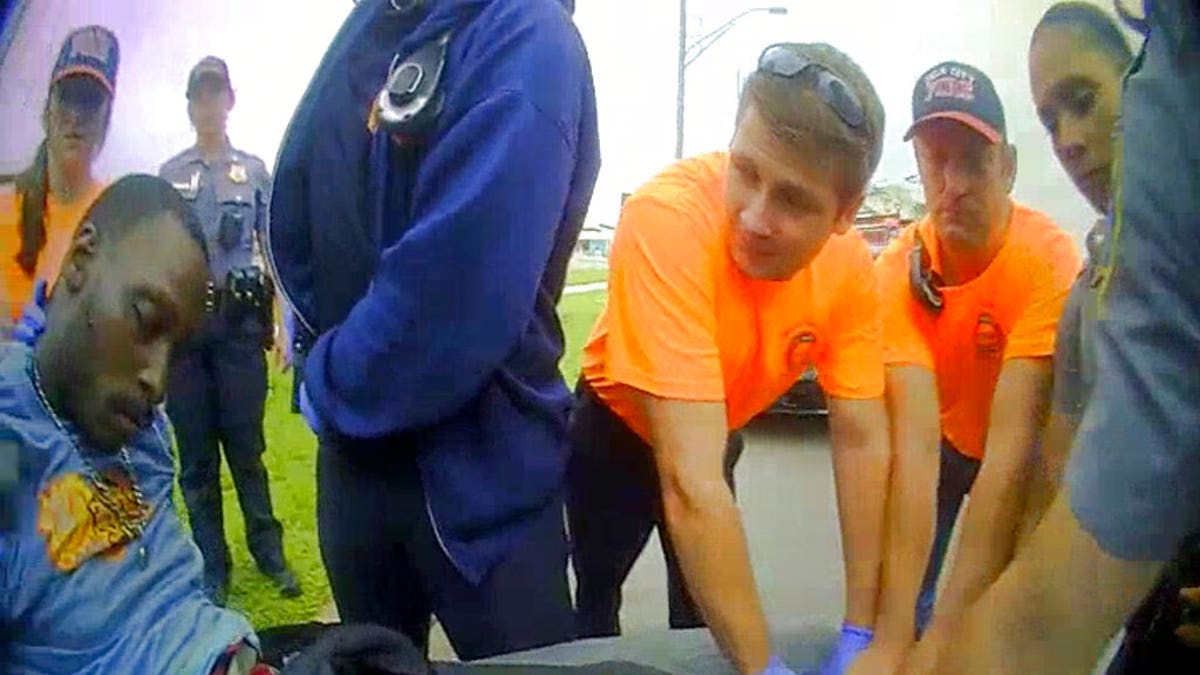Trump: I think I've done more for the black community than any other president
President Donald Trump touts criminal justice reform and economic success during an exclusive interview with Harris Faulkner.
Newly released body camera footage of a black man who died in police custody last year shows the suspect saying "I can't breathe" multiple times as he is being restrained by Oklahoma officers.
Police responded to reports that a man was brandishing a firearm on May 20, 2019, and footage released by the Oklahoma City Police Department shows the suspect, Derrick Scott, running from authorities as they chase him, telling him to "get on the ground."
When the two officers catch up to him, they attempt to put him in handcuffs, as Scott struggles against them saying, "I can't breathe."
An officer can be heard responding "I don't care" while straddling Scott's back and proceeding to arrest him.
At one point in the video, officers are heard telling Scott not to put his hands in his pocket.
Capt. Larry Withrow said at a news conference on Tuesday that police found a loaded gun in his pocket. He added that after an investigation by the police department and the district attorney, there is "no indication of any wrongdoing" by officers.
Scott's family demanded that body camera footage of the incident be released in the wake of George Floyd's death, which has sparked a national movement to end police brutality and excessive force by cops.
Floyd -- an unarmed black man -- died in police custody on Memorial Day after a former Minneapolis police officer kneeled on his neck for over eight minutes. Among his last words were "I can't breathe."
"We must continue to demand the end of fatal police maneuvers," the NAACP Legal Defense Fund wrote on Twitter Thursday following the release of the video.

In this image made from a May 2019 body-worn camera video of Oklahoma City Police Officer Ashley Copeland, paramedics and police officers carry Derrick Elliot Scott onto a stretcher after he was arrested and went in and out of consciousness during the arrest in Oklahoma City. Oklahoma City police released body-camera videos Monday, June 8, 2020, of Scott, an armed black man who died in police custody in 2019 after telling arresting officers "I can't breathe." (Oklahoma City Police Department via AP)
Winthrow explained that Scott was rolled onto his side in a "recovery position" to give him "a better opportunity to breathe and relax while they maintain control of the suspect.”
An ambulance arrives several minutes later, and Scott continues to jump and kick before falling, even as he is being loaded onto a stretcher and officers tell him to “quit fighting.” Footage from inside the ambulance shows one of the officers performing CPR.
Scott was pronounced dead an hour later at the hospital.
An autopsy report by the medical examiner's officer listed the manner of death as "unknown," but noted that the probable cause was a collapsed right lung. The report also notes there were indications of physical restraint, recent methamphetamine use, heart disease, and emphysema as contributing factors to his death, according to reports from The New York Times.
Winthrow defended the officer on camera, who can be heard saying “I don’t care” as Scott says he can't breathe.
“During the heat of a conflict like that, certainly that may be something an officer says, just understand the officers are fighting with someone at that point,” Winthrow said.
“It’s not uncommon for people when you’re struggling with them, when you’re trying to get them into control, to say, ‘I can’t breathe.’ You hear that frequently,” he added.
CLICK HERE FOR THE FOX NEWS APP
He also said that “once they had any indication that there was any medical distress, they called for medical assistance immediately and began to monitor the subject.”


